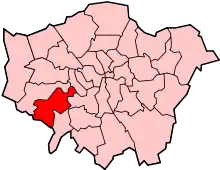Poppy Factory
The Poppy Factory is a factory in Richmond, London, England, where remembrance poppies are made. It was founded in 1922 to offer employment opportunities to wounded soldiers returning from the First World War, creating remembrance products for the Royal Family and The Royal British Legion’s annual Poppy Appeal. It is operated by a company that is a registered charity which provides employment support to disabled veterans across England and Wales. The factory makes approximately 36 million poppies each year.
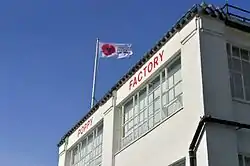 The Poppy Factory in Richmond, London | |
| Formation | 1922 |
|---|---|
| Type | Charity |
| Purpose | Remembrance poppies are made |
| Location | |
Region served | United Kingdom |
Official language | English |
Staff | 30 disabled veterans and disabled dependents of ex-service personnel are employed in the factory with 30 home workers |
| Website | www |
The corresponding organisation in Scotland is Lady Haig's Poppy Factory in Edinburgh, which was established in 1926 and makes approximately five million remembrance poppies each year.
History
Artificial poppies for the first poppy appeal in 1921 had been imported from France by Madame Anna Guérin, but in 1922 the Disabled Society, a charity established in 1920 by Major George Howson MC and Major Jack Cohen, received a grant of £2,000 from the British Legion's Unity Relief Fund to employ disabled ex-service personnel to make remembrance poppies in England.[1] Later that year, Howson wrote to his parents, “I do not think it can be a great success, but it is worth trying. I consider the attempt ought to be made if only to give the disabled their chance."
They set up in a former collar factory on the Old Kent Road in London. Soon the factory was employing 50 disabled veterans.[2] The factory made a million poppies within two months.
In November 1924, the Prince of Wales (later Edward VIII) visited the Poppy Factory, which made 27 million poppies that year. Most of the employees were disabled, and by then there was a long waiting list for prospective employees.[3]
The old collar factory eventually proved too small as demand increased, and in 1926 the factory moved to a disused brewery in Petersham Road, Richmond, Surrey. Housing for the workforce and their families was built on adjacent land and in 1932 the present factory was built. The original factory was demolished in 1972.
Present day
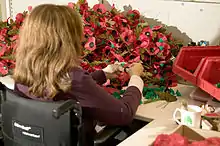
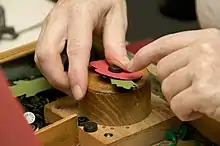
Approximately 30 disabled veterans and disabled dependents of ex-service personnel are employed at the Richmond factory to hand-make remembrance poppies, wreaths and symbols. Together with around 30 home workers, they produce approximately 11 million poppies, 135 000 wreaths and 1.1 million remembrance symbols[4] (originally remembrance crosses, now a variety of shapes for different religions, including for 'no faith') for The Royal British Legion’s Poppy Appeal, as well as special wreaths for the British Royal Family.
The Poppy Factory also provides individualised employment support to hundreds of ex-Service men and women with health conditions or impairments. A team of regional Employability Consultants work with veterans in their communities to provide career guidance, CV advice, interview coaching, opportunities with local employers and information about funding and training sources.
Around 62% of Poppy Factory veterans experienced mental health conditions and 58% reported physical health challenges,[4] such as visual impairments and musculoskeletal problems. Many veterans have a combination of both mental and physical health challenges.
According to a recent report, the charity’s "Getting You Back to Work" employability programme has close fidelity to the IPS model of Supported Employment.[5] Owing to this tailored approach, around 75% of Poppy Factory ‘clients’ remain in work for over 12 months.
Since 1928, The Poppy Factory has also organised the annual Field of Remembrance at Westminster Abbey.[6]
In November 2016, former chief executive Melanie Waters became the chief executive of Help for Heroes charity.[7] Deirdre Mills was later appointed the new chief executive; she had previously been a Director at the Commonwealth War Graves Commission.[8]
The factory in Richmond is open to the public for guided tours.
In July 2017, The Queen visited the Factory to celebrate the charity’s 90th anniversary.[6]
Lady Haig's Poppy Factory
.jpg.webp)
Lady Haig's Poppy Factory is a charity based in Edinburgh Scotland to provide employment to disabled veterans. It is an independent charity, but the name Lady Haig's Poppy Factory is a trading name of Poppyscotland of which it is a subsidiary.[9]
Lady Haig's Poppy Factory was founded in March 1926, shortly after the Royal British Legion's factory in London.[10] It was created to serve the demand for Remembrance Day poppies in Scotland.
The factory was created[11] at the suggestion of and by Dorothy, Countess Haig, wife of Field Marshal Douglas Haig, 1st Earl Haig, who had created the Haig Fund to assist ex-servicemen and which still raises funds through the UK's annual poppy appeal.
It grew from two employees in a former wood-chopping factory in the grounds of Whitefoord House to employ over 100 people by the mid-1930s, with a waiting list of over 300. In addition to the main task of making poppies, the employees made other goods by hand which were sold at three shops in Edinburgh and by a travelling shop throughout Scotland. The factory moved to its current premises, a former printing works, in 1965. Staffing levels and the range of goods made at the factory gradually declined after the Second World War, and increasing annual deficits were funded by contributions from the Earl Haig Fund Scotland. In 1998, the factory became an independent charitable company, The Lady Haig Poppy Factory Ltd
In November 2018 the factory was moved into Redford Barracks for 2 years temporarily while major renovations could be made while also adding a new learning facility. [12] With a Virtual Reality Application being made to preserve the memory of the old factory and to continue to bring the message of remembrance to a whole new generation.[13]
The factory is operated in partnership with Poppyscotland and, like the Poppy Factory in Richmond, also employs ex-service personnel, all disabled, making five million remembrance poppies in Edinburgh each year, to a slightly different design with four-lobed petals rather than two for English poppies, and 12,000 wreaths.[14]
Remembrance poppies
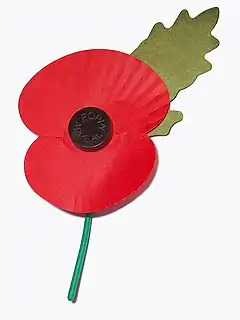 Royal British Legion pin poppy
Royal British Legion pin poppy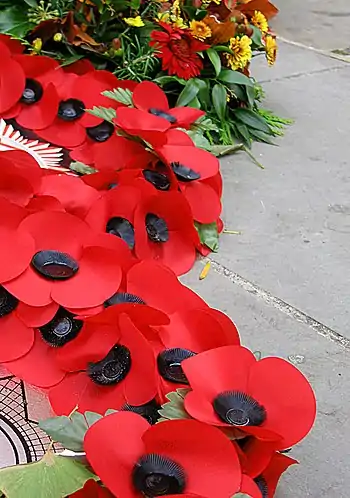 Royal British Legion wreath poppies
Royal British Legion wreath poppies Royal British Legion remembrance cross
Royal British Legion remembrance cross
See also
References
- "Veterans Minister visits Poppy Factory". A People In Defence news article. Ministry of Defence. 22 September 2011. Retrieved 10 November 2011.
- "The Poppy Factory: History". The Poppy Factory. Retrieved 10 November 2011.
- Philip Waller (2004). "Howson, George (1886–1936)". Oxford Dictionary of National Biography. Oxford University Press. Retrieved 7 February 2013.
- The Poppy Factory Annual Review 2015 http://www.poppyfactory.org/wp-content/uploads/2016/06/AnnualReview2015.pdf
- The Poppy Factory Employment in Mind Report 2016 http://www.poppyfactory.org/wp-content/uploads/2016/06/MH_report_2016.pdf
- Christian, Alex. "Queen visits Richmond Poppy Factory to celebrate charity's anniversary". swlondoner.co.uk. Retrieved 16 July 2017.
- Ricketts, Andy (5 August 2016). "Melanie Waters appointed chief executive of Help for Heroes". thirdsector.co.uk. Retrieved 16 July 2017.
- "New Poppy Factory Chief Executive Appointed". cobseo.org.uk. 7 November 2016. Retrieved 16 July 2017.
- paul (18 May 2015). "Poppyscotland". Poppyscotland. Archived from the original on 4 November 2016. Retrieved 3 November 2016.
- "The Start - Lady Haig Poppy Factory". Lady Haig Poppy Factory. Archived from the original on 4 November 2016. Retrieved 3 November 2016.
- "The Start - Lady Haig Poppy Factory". Lady Haig Poppy Factory. Archived from the original on 4 November 2016. Retrieved 3 November 2016.
- Currie, Julie. "Armistice 100: Lady Haig Poppy Factory is on the move". Falkirk herald. Falkirk herald. Retrieved 8 December 2018.
- "Poppyscotland: Their Memory". Pocket Sized Hands. Retrieved 8 December 2018.
- "How It's Done". Lady Haig's Poppy Factory. Archived from the original on 15 November 2011. Retrieved 10 November 2011.
External links
- Official website: The Poppy Factory
- The Poppy Factory, BBC Radio 4 and BBC Radio 4 Extra blog
- The Poppy Factory, broadcast on BBC Radio 4 at 11 am on 9 November 2011
- The Poppy Factory & Transport for London
- Official website: Poppyscotland
- Official website: Lady Haig's Poppy Factory
